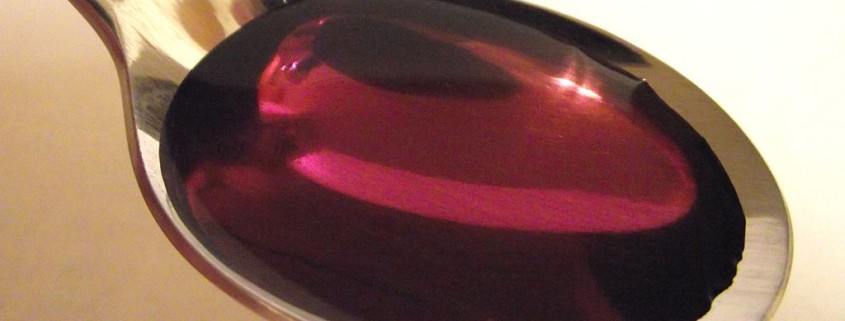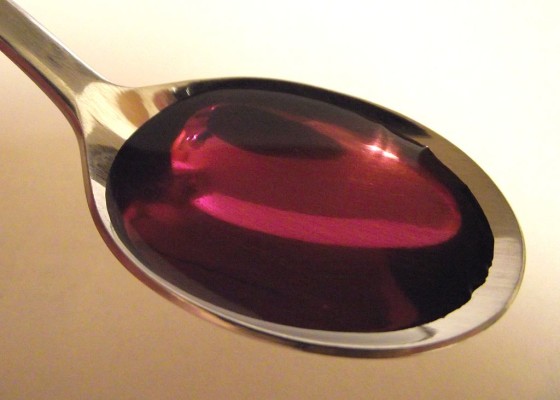Children’s Cold Syrup Recall
Last updated February 20, 2016.
If you’ve recently purchased children’s cough and cold syrup, check your medicine cabinets. Retailers nationwide are pulling several batches of the medicine off the shelves because the dose cups sold with the syrup are marked incorrectly, meaning you may accidentally give your child too much medicine.
Contents
What Drugs Are Affected?
The cold syrups in question are children’s guaifenesin grape liquid (100mg/5 mL) and children’s guaifenesin DM cherry liquid (100mg guaifenesin and 5mg dextromethorphan HBr/ 5 ml), manufactured by Perrigo. They come in 4 oz bottles packaged in a box with a dosage cup and are sold under a variety of store labels, including CVS, H.E.B., Rite Aid, Kroger, and more.
Stores including CVS, Stop & Shop, Giant, Dollar General, and others are pulling the cold medicine off their shelves. The affected lots have expiration dates in March 2017, but the retailers are pulling all bottles off of their shelves out of an abundance of caution.
What’s The Risk?
In most cases, a mild overdose of guaifenesin or dextromethorphan cold medicine won’t have any long-term ill effects. However, it does have the potential to cause serious symptoms such as muscle twitches or writhing, stupor, hallucinations, coma, seizures, irregular heartbeat, vomiting, nausea, and even death. Taking the wrong dose over a series of days increases the risk of suffering serious side effects.
Very young children and those who have trouble metabolizing the medication are most at risk for these effects.
What Should You Do?
First, check your medicine cabinet. If you’ve purchased one of the affected cough syrup bottles, you should take a photo for your records and throw it out. Perrigo has issued a recall of the product and you may be entitled to a refund either from the manufacturer or from the store that sold you the bottle. If you do have an affected bottle, you can call Perrigo at 1-888-345-0479 for more information.
If your child has taken this medication and is experiencing any of the symptoms listed above, you should seek immediate medical attention. Bring the cough syrup and the dose cup with you so you can show your child’s doctors how much medication your little one took.
What To Do In Case Of Recall
We trust our doctors and our pharmaceutical companies to do what’s best for our children’s health, but sometimes they make mistakes. When that mistake affects the safety of a medication (for children or for adults), the manufacturer will generally work with the FDA to recall the drug.
Most drug recalls are voluntary, but that doesn’t mean the recall isn’t serious. Voluntary recalls are simply those in which the manufacturer takes the necessary steps to pull potentially dangerous products from shelves rather than those in which the FDA has to step in for the safety of the public.
Whenever you receive notice of a recall, you should make a record of the product and then follow the instructions of the company that issued the recall for what to do with the product. That may involve throwing it out or sending it back to the company for further testing.
Recalls often happen because someone notices a problem during a quality control check or because someone reports something unusual or off about the drug. Unfortunately, problems don’t always get caught at that stage and the recall doesn’t happen until someone has gotten sick or injured.
Always Keep Records
If your child has suffered side effects because of an overdose of Perrigo’s cough syrup or because of any other recalled drug, you should keep careful records of what medication your little one took, including the lot number and expiration date, when you administered that medicine, and what side effects it caused. You should also keep records of any medical care your child needed as a result of the dangerous medication.
If your child is injured by a defective drug (or defective drug packaging or labeling), you may be entitled to compensation from the maker or seller of that medication for your child’s medical care, your lost wages, and other costs. Even if you’re not sure that you want to pursue compensation, you should keep careful records of your child’s care just in case. The drug maker may contact you about a potential settlement to avoid having to face a lawsuit and you should never accept a settlement offer before talking to an experienced local attorney about what happened and what your rights and legal options are. In that case, your records will come in handy.









Witch ones are recalls
Or just use a dosing syringe